Iran Appoints 3,000 Seminary Students As Teachers
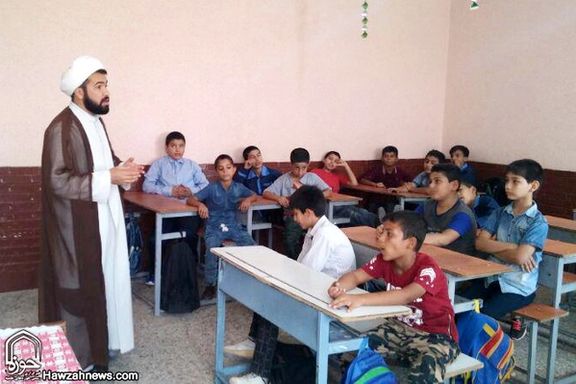
The ministry of education in Iran has announced the appointment of 3,000 male and female seminary students as teachers amidst a purge of the country's schools.

The ministry of education in Iran has announced the appointment of 3,000 male and female seminary students as teachers amidst a purge of the country's schools.
The move aligns with the ministry's broader initiative, known as the "Mosque, School, and Home" program, which includes plans to establish seminary-affiliated schools.
The development coincides with an ongoing transformation in the education system, marked by a significant "purge." Reports from September indicated the replacement of over 20,000 principals as part of the "transformation plan," implemented in the aftermath of anti-government demonstrations in 2022.
Education Minister Reza Morad Sahraei has refuted allegations of purging administrators, stating that some are retiring while others are being replaced by new individuals.
Ministers in President Ebrahim Raisi's administration have underscored the "revolutionary" nature of the education ministry. The collaboration between Iran's seminaries and the ministry of education extends to the "Amin" plan, initially focused on Qom but now encompassing other cities. Under this plan, 21,000 seminary graduates have been recruited to teach in 7,000 schools across the country.

Iran's Police closed down one of the country’s leading bookstores in Tehran on Friday for allowing women without “proper” Hijab to participate in a cultural event.
In a statement posted on its website, Shahr-e Ketab (Book City), a flagship chain bookstore, revealed that the police department in charge of overseeing retail shops, restaurants and similar businesses had sealed its central store in Tehran.
The police cited a “failure to abide by regulations of trade and interior ministry’s [directives]” as the reason for the closure of the popular bookstore in the heart of the capital.
Shahr-e Ketab, Iran’s largest chain of book and music stores, is a non-profit organization that operates dozens of modern bookstore-cafes across the country. In addition to selling books, it holds various cultural events.
“The Book City of Tehran was closed down over a few strands of hair!” Mohammad-Taghi Fazel-Meybodi, a prominent cleric who opposes coercion of women to wear the hijab, said in a tweet Friday. He questioned the religious and legal justification for suspending cultural centers and businesses over such minor issues and criticized the authorities for disgracing the country.
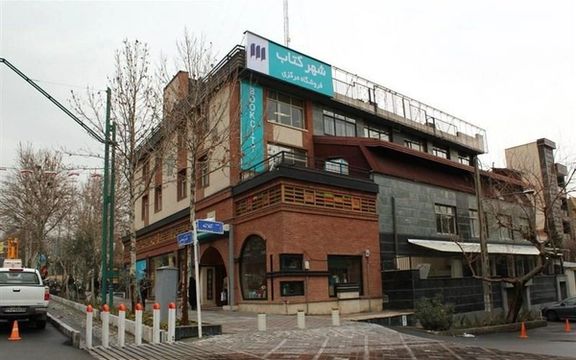
Fazel-Meybodi, like many others, also criticized the government for prioritizing the enforcement of hijab rules over addressing more pressing issues such as corruption and economic improvement. He suggested that the money spent on enforcing the compulsory hijab could have been better utilized to combat embezzlement and rising prices.
In recent months, authorities have increased pressure on businesses and retailers to enforce hijab rules and have warned or shut down thousands of businesses.
The closure of businesses for hijab-related issues, a tool used by authorities for four decades, is aimed at pressuring them to police women's hijab compliance, allowing the police and other authorities to avoid direct confrontation and potential clashes with citizens over hijab observance.
Many among Iranian women are increasingly refusing to wear the hijab even at the risk of being deprived from services in government offices, hospitals, and other public areas or their vehicles being impounded by the police for weeks.
On Friday an airport police official, Mohsen Aghili, said women who do not fully adhere to the “sharia-dictated hijab”, would no longer be served at airports.
After weeks of denial by various officials including the mayor of Tehran and the interior minister, the Secretary of the Supreme Cultural Revolution Council, Abdolhossein Khosropanah, on Friday confirmed that hijab enforcers are indeed organized by the council’s “Hijab and Chastity Taskforce” in coordination with the interior ministry.
Hijab enforcers, uniformed women in black veils, are sometimes accompanied by male plainclothes cameramen who record hijab breaches. They were initially stationed at metro stations in August but are now seen patrolling other public places, such as parks and busy streets, and admonishing women whose appearance does not conform to the dictated hijab rules.
Khosropanah also demanded gender segregation in universities and claimed that “the world has realized that gender segregation in different areas [of society] ensures better performance and security of both genders.”
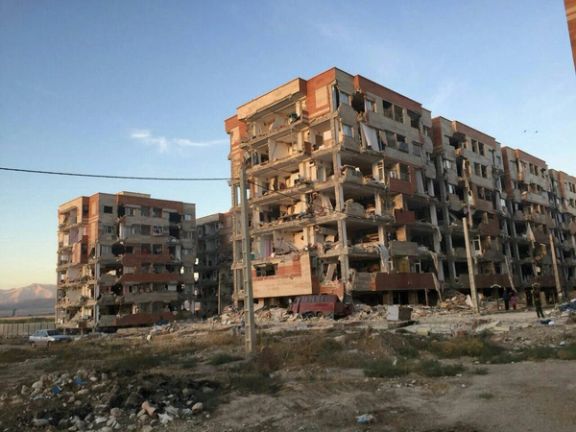
The Iranian government has finally delivered housing units as part of the Mehr Housing initiative to owners who have endured a 13-year wait.
However, the Tehran development's newly handed-over units lack essential utilities such as water, electricity, and gas.
The Tasnim News Agency reports that the residences also suffer from a lack of basic amenities, including elevators in high-rise buildings and adequate water pressure. As a result, residents of the newly allocated units either remain hesitant to move in or grapple with numerous challenges in their living conditions.
The Mehr Housing scheme, initially launched during President Mahmoud Ahmadinejad's tenure from 2005 to 2013, aimed to construct a total of 4.3 million housing units. The ambitious project continued under President Hassan Rouhani's administration.
However, many of the units experienced damage during a devastating earthquake in western Iran in 2018. Responding to the issues, President Rouhani called for an investigation, and numerous new homeowners voiced complaints about the lack of essential infrastructure and amenities, including public transport and schools, in proximity to the newly constructed apartment blocks.
President Ebrahim Raisi, during his campaign, made a commitment to build one million housing units annually. However, housing market experts and some politicians have deemed this pledge "impractical." The average price of one square meter of housing in Tehran is approximately 600 million rials ($1,200), significantly higher than the monthly minimum wage of around $120 (without benefits).
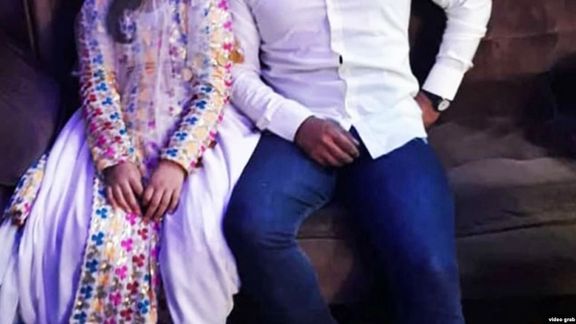
Approximately 184,000 marriages involving girls under the age of 15 were registered in Iran between 2017 and 2022 as girls dropped out of school at increasing rates.
A report from the Research Center of the Iranian Parliament said girls were dropping out of school to get married in rising numbers. "The total number of school dropouts in the academic year 2015-2016 was 862,777, and in the academic year 2021-2022, it surged by 26%, reaching 911,272."
Mansour Fat’hi, an associate professor of social welfare at Allameh Tabataba'i University, pointed to poverty as the primary issue in slum areas, underscoring that around 70% of underprivileged children find themselves in the lowest economic conditions amidst Iran's dire economic crisis.
The Ministry of Education reported that approximately 30% of high school students and 20% of girls aged 15 to 18 left school in 2022 due to early marriages.
Despite global standards considering individuals under 18 as "children", child marriages are allowed from the age of 13 for girls and 15 for boys in Iran. Supreme Leader Ali Khamenei has consistently emphasized policies promoting population growth, fertility, and early marriages.
Iran's Statistical Center recorded around 25,900 cases of girls under 15 getting married in 2022, less than the 32,000 such cases registered in 2021, suggesting discrepancies in the data released by the government.
UNICEF shortlisted Iran in the Middle East and North Africa's top five countries for child marriage in 2020 and according to Iran Open Data, one out of five marriages is among minors.
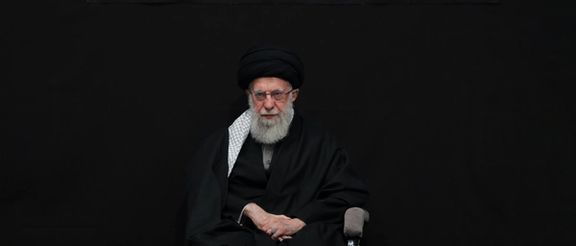
Russia's support for the United Arab Emirates in its dispute with Iran over the ownership of three Persian Gulf islands has turned into a controversy in Tehran.
The Iranian leadership, typically reticent about Russia's double standards, has, for the second time this year, heightened its response to Moscow's stance. Supreme Leader Ali Khamenei's most senior foreign policy adviser, former Foreign Minister Ali Akbar Velayati, implicitly criticized Russia's behavior by stating, "Iran will not allow any foreign entity to intervene in its internal affairs."
In a similar situation earlier this year, Velayati, following Russia's joint statement with the Gulf Cooperation Council (GCC) in September, emphasized the importance of Iran's friendly and strategic ties with Russia. He pointed out that both sides' bilateral and regional interests should be considered. Notably, Supreme Leader Ali Khamenei remained silent, as is often the case, regarding Russia's actions that undermine Iran's territorial integrity.
Recently, the Iranian Foreign Ministry criticized "part of the statement of the 6th Arab-Russian Cooperation Forum held in Morocco, dismissing the claims on three Iranian islands as baseless and unacceptable." Foreign Ministry Spokesman Nasser Kanaani asserted that "The Islands of Abu Musa, Greater Tunb, and Lesser Tunb are eternal parts of Iran and inseparable from the Islamic Republic." He underscored that Iran's sovereignty over these islands is non-negotiable, emphasizing the country's commitment to protecting its territorial integrity.
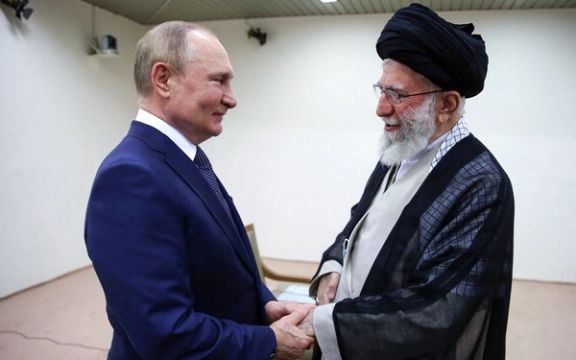
In response to the Foreign Ministry's statement, Iranian international lawyer Reza Nasri highlighted that Russia's support for the UAE's sovereignty claims over the Persian Gulf islands contrasts with Iran's support for Russia in the Ukraine conflict. Nasri emphasized the need for Russia to be a strategic ally to Iran and called for respect for Iran's territorial integrity.
Britain, which maintained control of Abu Musa, and the Greater and Lesser Tunb it had occupied in the 19th century, withdrew its forces from the Persian Gulf in 1971 and the United Arab Emirates was formed. However, Iran’s Imperial government at the time decided to reclaim what it believed were historical Iranian islands.
Mohammad Reza Shah sent the Iranian navy to secure all three in November of the same year, two days before UAE was established. Iranian forces remain on the islands, with only Abu Musa having much of a civilian population of several thousand.
X (Twitter) users criticized the untimeliness of Russia's behavior, especially as Iran is working to finalize a strategic security pact with Russia. Some social media users labeled Iranian officials as "traitors" over Tehran's response.
Meanwhile, Foreign Minister Amirabdollahian called on Moscow to respect Iran's territorial integrity and sovereignty, after Russia supported the UAE’s sovereignty claims over three Persian Gulf islands. He said during a telephone conversation with his Russian counterpart Sergey Lavrov: "The Islamic Republic of Iran completely rejects any claim in this regard by any party. Respect for the sovereignty and territorial integrity of countries is one of the fundamental principles in relations between countries, and Tehran makes no compromises with any party when it comes to respect for its territorial integrity and sovereignty issues." Lavrov responded that "The sovereignty and territorial integrity of the Islamic Republic of Iran has always been respected by Russia and Moscow's official policy in this regard should never be doubted."
Earlier in this year, the media pointed out that some Iranian hardliners supported Russia's humiliating stances on the three Iranian islands in the Persian Gulf. At the time Raisi-administration-owned daily Iran charged that Iranian media outlets that criticized Russia's positions get their orders from the United States.

Iran's Naval Forces introduced new cruise missiles on Sunday shortly after the US military blamed Iran for a drone attack on a vessel in the Indian Ocean.
US CENTCOM announced on Saturday that a drone launched from Iran targeted and hit a chemical tanker in the Indian Ocean, known as the Chem Pluto, the first time the US has directly blamed Iran for an attack as maritime routes have become a key strategy from Iran's proxies amidst the war in Gaza.
A fire onboard was successfully extinguished, and there were no casualties. Iran has not commented. It comes while its Yemeni proxy the Houthis have announced a blockade of the Red Sea, in allegiance with Iran-backed Hamas in its war against Israel.
According to the state news agency IRNA, the additions to the army's naval forces include strategic cruise missile systems named Talaiyeh and Nasir, along with some other drone systems and a submarine locator system.
During the unveiling ceremony, Shahram Irani, the commander of the naval forces, highlighted that the Talaiyeh sea cruise missile boasts a range exceeding 1,000 kilometers and operates intelligently throughout its flight. Additionally, Irani introduced the Nasir sea cruise missile, which boasts a range of over 100 kilometers and exhibits highly advanced capabilities in demolition operations.
Iran, possessing one of the largest missile programs in the Middle East, asserts that its missiles can reach Israel and US bases in the region. Despite opposition from the United States and European countries, Tehran has declared its intention to persist with the development of its “defensive” missile program.
Iran maintains that its ballistic missiles serve as a deterrent and retaliatory force against the United States, Israel, and other potential regional adversaries.